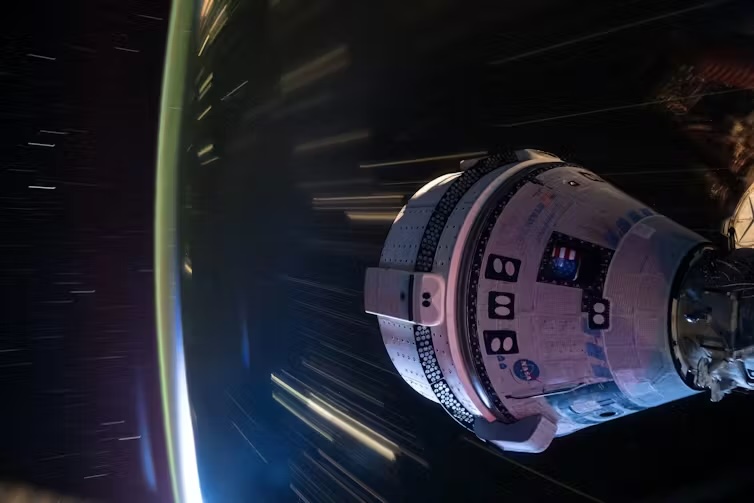Two astronauts marooned in area might sound just like the plot of a Hollywood blockbuster, however for 2 NASA crew members, it’s now a actuality. Commander Barry Wilmore and pilot Sunita Williams are presently in limbo on the International Space Station (ISS).
They arrived within the Boeing Starliner spacecraft — the primary check of the spaceship with astronauts. Wilmore and Williams have been supposed to remain on the ISS for round eight days and return on the identical spacecraft. However there’s now debate in regards to the security of Starliner after it skilled helium leaks and thruster problems on its strategy to the ISS.
In coming days, Nasa and Boeing might resolve to clear Starliner to hold the astronauts again to Earth. This implies their keep may not final an excessive amount of longer. But when officers resolve towards Starliner, the astronauts face ready an additional six months in orbit earlier than returning. So how do astronauts deal with a possible six-month look forward to a raise dwelling?
Ready for issues is tough at the most effective of occasions. Below regular circumstances, it’s irritating, anxious and anxiety-provoking. However in excessive conditions, with excessive stakes, ready will be purgatory.
A part of the rationale that ready is tough is that it distorts our sense of time. Consider final time you have been ready for a delayed practice, check outcomes or a textual content from a possible new accomplice. Did it fly by or drag? For most individuals, time spent ready crawls at a glacial tempo. Consequently, delays and intervals of anticipation usually really feel for much longer than they really are.
Ready slows our notion of time, as a result of it modifications the period of time that we spend thinking about time. Throughout regular each day life we frequently ignore time; our brains have a restricted capability. If time is not essential, we merely do not give it some thought, and this helps it to cross shortly.
Associated: Why time seems to fly by
After we are ready, our need to know when the wait is over will increase how a lot we take into consideration time. This “clock watching” could make the minutes and hours really feel like they’re passing at a snail’s pace. Stress, discomfort and ache exacerbate this impact, which means that ready in tough conditions can seem even longer.

Ready additionally slows our notion of time as a result of it influences what we do and the way we really feel. Regular life is busy and filled with ever-changing actions and interactions. The sudden want to attend halts the circulate of life, usually leaving us with nothing else to do, thus rising ranges of boredom and frustration.
On the whole, time stuffed with exercise passes more quickly. All of us received a style of this throughout COVID lockdowns. After we have been caught inside unable to see associates and interact in regular each day actions, the lack of routine and distractions triggered time to pull for a lot of.
For the astronauts caught on the ISS, anxiousness about when they are going to return, restricted alternatives for actions and fewer alternatives to contact associates and households mix to make their wait to return dwelling really feel considerably longer than six months — if it ought to come to that.
Nonetheless, as lecturers who analysis the consequences of time on human psychology and biology, our ongoing work with crew members at analysis stations in Antarctica goals to make clear whether or not ready in excessive environments is completely different to ready throughout regular each day life.
A 12 months in Antarctica
Whereas being caught for six months on the ISS might sound like many individuals’s worst nightmare, it isn’t unusual for scientists to spend lengthy intervals remoted and confined in excessive environments. Yearly, organisations such because the Instituto Antártico Argentino (which makes use of the Belgrano II Antarctic station), the French Polar Institute and the Italian Antarctic Programme, in cooperation with the European Space Agency (which all use Antarctica’s Concordia station), ship crews of individuals for as much as 16 months to conduct analysis on the frozen continent.
Through the March to October polar winter, groups spend six months in close to darkness — and from Could to August, in full darkness — dealing with outdoors temperatures of as much as -60C, wind speeds of 160 km/h (100 mph) and storms which forestall nearly all outside exercise. Restricted web protection can even forestall fixed communication with the skin world.
For the final 12 months, we now have researched how life in Antarctica influences folks’s expertise of time. Every month, we requested crew members how time felt prefer it was passing compared to earlier than their mission. Trapped on base, with restricted contact with the skin world, you would possibly anticipate time to pull. Nonetheless, our outcomes recommend the other could also be true.
Evaluation of crew members’ experiences indicated that being always busy with advanced duties similar to scientific analysis helped time to cross swiftly, in response to 80% of crew responses. Solely 3% of responses indicated that point truly dragged, and these stories occurred when nights have been lengthy and there was little to do.
These experiences might present hope for these caught on the ISS. Like life on an Antarctic station, these Nasa astronauts have a busy and mentally demanding existence. These components might assist time to cross shortly.
Nonetheless, a key issue of their wait could also be their capability to tolerate the uncertainty of when they are going to return. Wilmore and Williams will spend their time in an area equal to the inside a Boeing 747 airplane. However higher details about “when” issues will occur and “why” delays are being incurred may help folks to tolerate ready and scale back its influence on their wellbeing.
This edited article is republished from The Conversation underneath a Artistic Commons license. Learn the original article.


